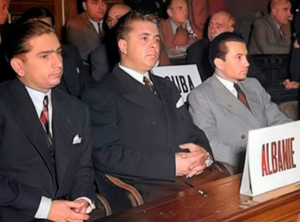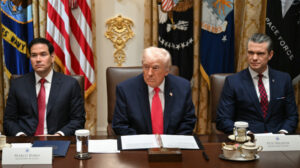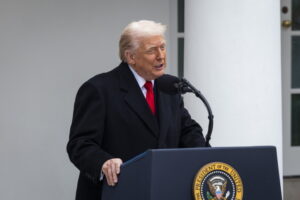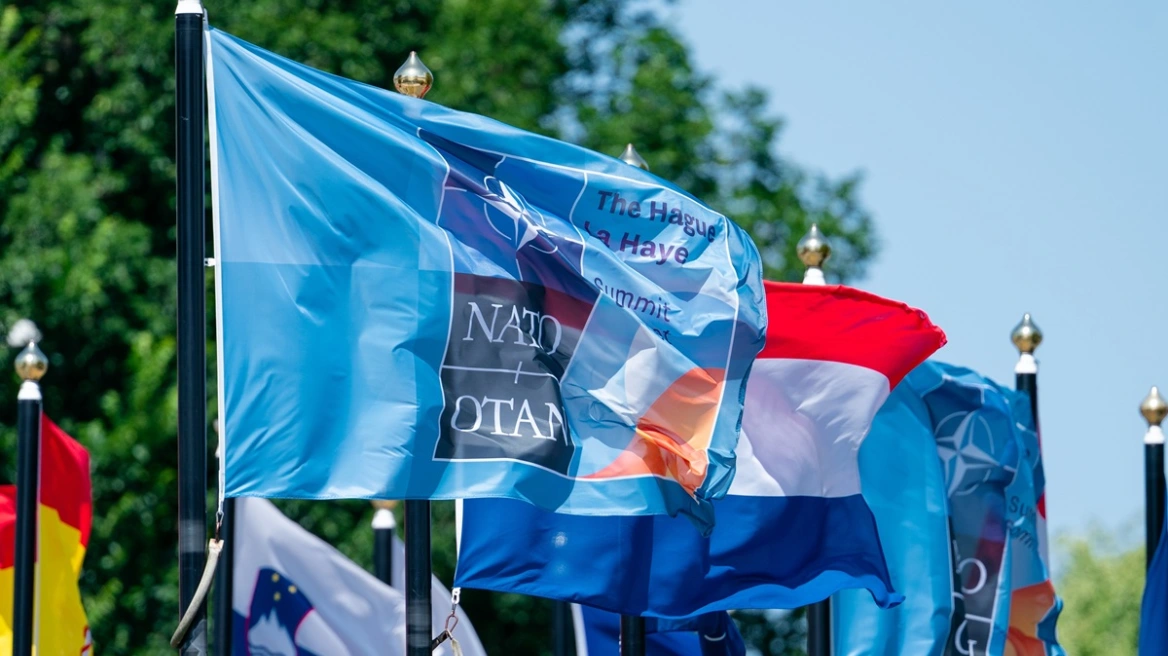One of the issues often raised by Albania, both at the bilateral and international levels, is the so-called “Cham issue.”
This is a non-existent matter that has entered the diplomatic arsenal of the neighboring country as a counterbalance to the Northern Epirus issue.
Of course, the latter is real; Albania has never fulfilled the obligations it took on with the Corfu Protocol, and especially during the years of Enver Hoxha, the Greeks of Northern Epirus suffered immensely.
As we have written many times, Albania surrendered without a fight to the Italians in 1939, and it is indisputable that Albanian battalions accompanied the Italians during their attack on our country in 1940.
During World War II, Greece repeatedly heard good words and promises regarding the cession of Northern Epirus, the Dodecanese, parts of Bulgaria, and Cyprus. In the end, only the Dodecanese were granted to us after tough negotiations.
When World War II ended, beyond the secret consultations of the great powers, there was also an official summit, the Paris Peace Conference (1946), which determined the future of Europe.
At that time, Greece officially presented its claims. The speech of the Albanian leader Enver Hoxha, who appeared almost out of nowhere in Paris in August 1946, is particularly noteworthy.
There, in a speech full of distortions of reality and inaccuracies, he presented Albania as a victim of circumstances, a country that fought fiercely against the Axis, and roughly as one wronged by history.
He then launched a harsh indictment against Greece, particularly against the then Prime Minister Konstantinos Tsaldaris, who, in his own speech, had raised the issue of Northern Epirus.
Today, we will look at the general points of what Hoxha said about Albania and its stance in the War, and we will present the extensive part of his speech about Greece in full.
We will also refer to the petition filed by Ukraine, one of the Soviet republics at the time, against Greece, concerning its relations with Albania, and we will conclude with a revelation attributed to Dr. Stavros Ntagio, which we present today thanks to the permission he kindly and graciously granted us.
Greece gave Albania approximately 218 million drachmas during World War II, before the drachma was devalued, as war reparations, since Albania was considered a victorious country.
What is even more unbelievable is that both in 1946, when K. Tsaldaris raised the issue, and in 1984, when the PASOK government of Andreas Papandreou examined it, the Bank of Greece and the General Accounting Office of the State were unable to find more information.
Did previous governments know this, and what about the current one? How much value do the 218 million drachmas given to Albania 80 years ago have today? Is there a willingness to claim them or not? Will anyone from the relevant ministries even bother to deny us? Let’s start with Enver Hoxha’s speech in Paris on August 21, 1946, and we will return to the issue of reparations.
Enver Hoxha: From Paris to the Top of the Albanian Communist Party Leadership
Before we begin referencing what Hoxha said at the Peace Conference in Paris, it should be noted that he was born in 1908 in Gjirokastër and graduated from the French Lyceum in Korçë.
In 1930, he was accepted into the School of Botany at the University of Montpellier in France, but he never completed his studies.
In 1935, he went to Paris, where, with money from his brother-in-law Bahri Omari, an anti-monarchist nationalist in self-exile in Italy, Hoxha declared himself overnight the representative of Albanian communists in Paris.
He became involved in circles of French communist intellectuals, publishers, philosophers, and avant-garde artists in the luxurious salons of the French Marxist Paul Vollant-Couturier’s home.
The endless discussions at Couturier’s house formed the basis for Hoxha’s communist “beliefs.” In late 1935, Hoxha went to Brussels, where he was hired as an accountant. However, he became involved in a huge financial scandal for which he was never tried!
He returned to Albania in 1937 and taught at the French Lyceum in Korçë. With the outbreak of World War II, Hoxha, a person of average education, without any party action, “unlikable and inexperienced,” according to Blendi Fevziu, shot up in the hierarchy of the Albanian Communist Party when it became unified in 1941.
At the same time, historical figures in the Party were sidelined. A significant role in Hoxha’s rise within the Communist Party was played by the Yugoslav leader Tito.
When the Italians withdrew from Albania in 1943 and the Nazi invasion occurred, Hoxha was elected General Secretary of the Communist Party and by the end of 1944, he took charge of the first post-war transitional government.
In the interim, he waged an unrelenting purge against his party’s internal opponents. On May 24, 1944, Hoxha was elected head of the Anti-Fascist National Liberation Council by the Albanian Communist Party Congress in Premet, and on November 28 of that year, the communists entered Tirana.
Thus began Hoxha’s long reign, which ended with his death in April 1985.
During Hoxha’s rule, 5,037 men and 408 women were executed, 16,788 men and 7,367 women were sentenced to 35 years in prison, 70,000 people were exiled, and 354 foreign citizens, 95 from Kosovo, faced execution.
Hoxha’s Speech at the Plenary Session of the Paris Peace Conference (August 21, 1946)
Let us now look at the key points of Hoxha’s speech in Paris on August 21, 1946. According to the Albanian leader, the Albanian people were the first to take up arms against the Italian fascists and stopped their struggle when Nazi Germany was defeated. The Italians invaded Albania with the aim of enslaving it in 1939, but they made a miscalculation.
“The Albanians are not the kind of people who endure slavery,” Hoxha said. “Our history is proof of this, our mountains and forests echo with the heroic struggles of our ancestors (who they are, of course, remains unknown), who fought fiercely for centuries against their oppressors.”
Hoxha then stated that when the Italians attacked Greece, the Albanians rushed to support the Greeks: “The brave and strong armed actions of the Albanians were a great help to the Greek people who had the same fate as ours,” Hoxha continued. He said that the Italians retaliated against Albanians who helped the Greeks.
Furthermore, when the Italians capitulated and the Germans attacked Albania, Hoxha’s countrymen did not hesitate to fight them as well, driving them out of Albanian territory into Yugoslavia.
On the day of the Allied invasion of Normandy, four German divisions were fighting in Albania (and apparently, the success of the Allied invasion is owed to the Albanians…).
“Albania became the bastion of the struggle for freedom and independence,” Hoxha continued, listing the losses of his country as well as those of its enemies. 28,000 Albanians were killed, 12,600 wounded, 10,000 imprisoned as political prisoners in Italy and Germany, and 35,000 forced into labor camps. Albania’s population at the time was 1 million (this part was correct; it was about 1.1 million).
On the other side, 53,639 Italians and Germans were killed, wounded, or captured (an incredible precision regarding the number).
After citing the flattering words of various foreign politicians and military officials about his country, Hoxha launched an unprecedented attack on Greece, particularly on the then Prime Minister Konstantinos Tsaldaris, who had raised the issue of Northern Epirus at the conference a few days earlier. Below is the excerpt of Hoxha’s speech concerning Greece.
It is important to note that the number of Northern Epirots was not only 35,000 as claimed by the Albanian leader, but many more.
Hoxha’s crude lies about Greece and his vulgar personal attack on Konstantinos Tsaldaris:
“However, before presenting my country’s position on this matter, I feel it is my duty to respond to the false accusations made by Mr. Tsaldaris, the head of the Greek delegation, the accusations and claims he has made against Albania in various previous sessions of the Conference.
Mr. Tsaldaris tries to prove that Albania is not a friendly country, that Albania attacked Greece, and consequently is in a state of war with Greece.
On the other hand, Mr. Tsaldaris claims Southern Albania, pretending it is Greek territory and rightfully belongs to Greece.
As for the question of whether Albania is a friendly country and whether it deserves this title, Mr. Tsaldaris has our answer with the words I just said.
The Albanian people contemptuously reject the vile accusations of the Greek representative, who labels my country as an aggressor.
The Albanian people have never attacked the honorable Greek people, nor have they ever declared war on them. On the contrary, we sympathized with their cause, which was also the cause of the Albanian people, as both nations shared the same fate and faced the same enemy.
The Albanian people demonstrated, not only during the antifascist war but also during World War I, their determination to fight Italian imperialism, which had its eyes on our land and resources.
A terrible and relentless war was waged between the Albanian people and the Italian fascists. That is why Mr. Tsaldaris will not convince anyone, even a fool, with his arguments.
Mr. Tsaldaris should ask for clarification from fascist Italy for the shameful attack on his country, not from us.
He should ask for accountability from war criminal Victor Emmanuel (the king of Italy at the time), not from Albania, which was invaded by the same enemy that invaded Greece, and whose people, like the Greek people, fought fiercely for their independence and sovereignty.
It would be ridiculous to think that, with a meaningless decree, Victor Emmanuel, the King of Italy, could place the blame on the Albanian people who waged a relentless war against Italy from the first days of the occupation and even attempted to assassinate the king during his only visit to Albania in May 1941.
Mr. Tsaldaris uses the declaration of war by the Albanian quisling Vërlaci as an argument to defend his claims.
The Albanian people identified the occupiers and the quislings (collaborators with the occupation forces) and made no distinction between them.
The Albanian quislings, like all the other quislings in Europe, have nothing in common with our people. They were the most despicable enemies of the people, and as such, they were consistently fought.
The Albanian quislings could not gather more than a few weak battalions against the liberation army and the Allies, while the Albanian people rose up as one against the oppressor and the traitors. This is the difference between our people and the quislings.
Would Mr. Tsaldaris like to know what the Albanian people did to those quislings? Only this: they wiped them all out, and they paid with their lives for the crimes they committed.
And if he wants to know more about the fate of their collaborators in the war, who fled with the German troops, he should know that these criminals can be found in the finest hotels in Rome, the city from which the planes that so inhumanely bombed Albanian and Greek women and children took off.
I would like to ask Mr. Tsaldaris: why does he not mention the quislings of Europe who harmed the Allied cause so severely, and specifically, those quislings who, after committing horrific crimes, now walk freely in the streets? Why does Mr. Tsaldaris not dare to identify the other European quislings with their respective nations?
I would like to remind you that during the Italo-Greek War, several hundred Albanians, forced into service by the Italians, rose up against them and made common cause with the Greek people.
Some abandoned the Italians and joined the Greek forces to fight alongside them, but (the Greeks) treated them as prisoners of war and sent them to Crete, where, during the German invasion, they fought bravely alongside British soldiers.
Some joined the Albanian partisans, while others were disarmed by the Italians, withdrew from the front, were confined to the Sijak concentration camp, and were brought before a military tribunal for “high treason.”
On December 22, 1940, the Reuter news agency sent the following article from Manastir: “Albanian soldiers, who were forcibly conscripted into the Italian army, revolted yesterday in a section of the Italian rear, causing significant losses to the enemy before being captured. Some have reached the hills and continue to resist.”
On December 4, 1940, the Anatole news agency reported from Athens that “an Italian general captured by the Greeks stated that the Italian army was suffering heavy losses due to the defection of the Albanians.”
Even Mussolini himself, in a letter to Hitler on November 22, 1940, tried to justify the Italian losses in the same manner.
Here is what Badoglio says in his memoirs:
“The campaign has begun. The whole world knows its progress. The Greek troops in Epirus are bravely resisting on the Kalamas River, while the Albanian forces and units that were part of our divisions either betrayed us, sabotaging our operations, or switched sides to the Greeks.”
The newspaper Le Figaro, in its issue No. 588 on July 4, 1946, referring to the Italo-Greek War, writes:
“The Albanian partisan detachments, for their part, attacked Italian convoys and troops or the roads leading to the front.”
On October 26, 1940, the BBC reported:
“We are informed from Albania that Albanian partisan units, operating behind the Italian lines, are cutting and sabotaging communication lines, spreading terror among the isolated Italian detachments.
Armed groups have managed to enter the capital and have posted proclamations on all government buildings, even the palace of the Italian government, calling on the Italians to leave Albania.”
Similarly, on January 4, 1941, the AA (BBC) reported:
“Military circles point out that the Albanians are giving the Greeks significant help against the Italians.”
But along with his false accusations against the Albanian people, perhaps Mr. Tsaldaris should give us an explanation for these questions:
Does he also consider attacking nations, like Albania, the various European nations whose quislings not only sent battalions but even organized entire missions against the heroic Red Army, which was an example of heroism and bravery for all nations, and at the same time their most reliable support? It will be hard for him to answer this question.
Does Mr. Tsaldaris consider France to be an aggressive country, from which Hitler planned to launch his attack on England? He will also struggle to answer this question.
Mr. Tsaldaris believes he can say whatever he wants about the small country of Albania, but he is mistaken. His useless arguments will not last long.
No, the Albanian people were never and will never be an aggressor, and are not a threat to the Greek people, as Mr. Tsaldaris claims.
The attacks by the Greek representative on our country and his claims that we are the ones causing problems remind us of one of La Fontaine’s fables. We have always lived in harmony with the Greek people, with whom we fought side by side against the Italian and German fascist invaders.
During our antifascist war, the Albanian people created bonds of sincere friendship with their neighbors, the Yugoslav and Greek peoples.
In light of these events, the Greek accusations appear to be what they truly are: lies without any foundation.
However, has Mr. Tsaldaris so quickly forgotten that the Greek quislings, along with the Germans, often fought against the Albanians and were responsible for a thousand atrocities?
Here are some facts:
On September 8, 1943, the day of Italy’s surrender, the Germans, coming from the Sajadha area and led by a captain of Zervas named Vitos, entered Konispoli and burned more than 50 houses.
During the major winter offensive of 1943-1944, launched by the Germans against our National Liberation Army, the German forces, together with Zervas’s units, entered Albania from Greece and set fire to the areas of Zagoria and Pogoni (this is true, but Pogoni, along with eight of its villages and Zagoria, never belonged to Albania).
Other units of Zervas, together with the Germans, fought against the Albanian partisans in January 1944 and burned the villages of Krane and Dermis, as well as the homes of all the partisans of the Greek minority in Dropulli, while in February 1944, units burned the village of Dhrovjan.
During another large-scale attack launched by the Germans in June 1944, Zervas’s forces came again, together with the German troops from Greece, crossing the border and setting fire to all the villages in the Zagoria area that they had previously abandoned (Note: What is the connection between Albania and Zagoria, and why did Hoxha protest?).
If the British had let him, Zervas would have occupied a large part of Northern Epirus; this is certain. Every time the Germans came from Greece to attack the forces of the National Liberation Army, their main support was the armed units of the Greek quisling general Napoleon Zervas.
The Greek delegation claimed that the current Albanian government follows a policy of denationalization of the Greek minority in Albania.
Gentlemen, the Greek minority in Albania, consisting of 35,000 people, fought side by side with the entire Albanian people against the fascist and Nazi invaders, and against the Albanian and Greek quislings. Today, in the People’s Republic of Albania, it enjoys equal rights with the Albanian population.
It has 79 Greek-language schools, a Greek-language high school, its own autonomous local administration, just like the Albanian population, and sends representatives to the People’s Assembly. There are also citizens from the Greek minority in the army and government (Note: Why was Albania condemned by the UN at that time for its stance towards the Greek minority?).
On the other hand, I do not know if the distinguished delegates are aware of the terror exercised against the Albanian minority in Greece.
Of the 60,000 Albanians who remained in Greece according to the London Treaty, from 1913 to 1923, 35,000 Albanians were forcibly relocated to Turkey as “Turkish nationals” in exchange for Greeks from Asia Minor (Note: Hoxha was lying, there were never 60,000 Albanians, or Cham Albanians, in Greece and they never went to Turkey, due to the intervention of Theodoros Pangalos).
Contrary to the official commitments made by Greece, the Greek governments have always followed a policy of extermination of the Albanian minority in Greece and have never recognized that it had rights.
In June 1944 and March 1945, the armed units of the quisling general Napoleon Zervas tried to wipe out the remaining Albanians: they set fire to their villages, looted their property, and killed thousands of men, women, the elderly, and children.
More than 20,000 Albanians (i.e., Chams) who managed to escape took refuge in Albania, where, although assisted by the government and the Albanian people, they live in great poverty.
However, the real goal of all these claims by the Greek representative is to take two areas from Albania, those of Korça and Gjirokastër, which have always been among the most fervent centers of Albanian patriotism, both during the long period of Turkish occupation and during the National Liberation struggle against the Italian and German invaders.
These goals reflect the old policy of the protagonists of the “Great Idea,” that is, Greek imperialistic expansion throughout the Balkans, an idea that has taken root in the minds of today’s Greek leaders.
In reality, these people, with their claims on Albania, their daily provocations at our borders, and their intrigues, such as the proposal made by Mr. Tsaldaris to the Yugoslav representative to divide Albania between Yugoslavia and Greece, are trying to disrupt peace in the Balkans.
Gentlemen, we consider it inappropriate and unacceptable for this Conference to examine the issue of the territorial integrity of Albania. The Albanian people, small in number but great in sacrifices made for the common cause, are not here to discuss their borders, but to express and claim their rights.
We officially declare that within our current borders, there is not an inch of foreign territory (Note: What is the relationship of Northern Epirus with Albania?), and we will never allow anyone to infringe upon them, because for us they are sacred.
Source for Hoxha’s speech: Marxists Internet Archives (2010). The speech was first published in the newspaper Bashkimi, issue No. 540, on September 22, 1946.
Ukraine’s appeal against Greece to the UN regarding Greek-Albanian relations!
Another interesting diplomatic event of the post-war period was Ukraine’s appeal to the UN Security Council against our country for its policy towards Albania!
The appeal was filed on August 23, 1946. It accused Greece of aggression against Albania, persecution of minority populations (Note: obviously referring to the Chams), and “irresponsible policies” that created a “serious danger to the peace and security” of the Balkans.
It also accused Great Britain of intervening in favor of the monarchy in the referendum that was to take place in Greece on September 1. During the debate on the appeal, Greece was represented by the Ambassador to the UN Vasileios Dendramis (1883-1956) and the experienced Ambassador Athanasios Agnides (1889-1984). After several sessions of the UN Security Council, the Ukrainian appeal was rejected by a vote of 9-2.
It is worth remembering that at that time Ukraine was one of the “Republics” of the USSR, so it acted on Stalin’s orders, to support his protege Hoxha…
Ukraine supposedly had a legal interest because it borders the Balkans and was concerned with maintaining peace and order in the region.
This was why it was chosen by Stalin. It should also be noted that the Soviet representative and later Foreign Minister Andrei Gromyko was alongside the Ukrainians and strongly opposed the possible cession of Northern Epirus to Greece.
The War Reparations of 218,300,000 Drachmas That Greece Paid to the… Victorious Albania
A few days ago, in a post on Facebook, Dr. Stavros Daggios mentioned that Greece paid Albania 218,300,000 drachmas (before the devaluation of the drachma).
This amount was claimed and received by the neighboring country as a “victorious state.” We contacted Mr. Daggios, who confirmed this fact.
We are presenting his post in full, with one note: the word parelkýo means to procrastinate, to delay.
In his reply to Enver Hoxha at the Paris Peace Conference on August 23, 1946, Greek Prime Minister Konstantinos Tsaldaris first raised the issue of reparations from Greece to Albania.
Specifically, Tsaldaris stated: “Albania claimed and received, in its capacity as a victorious state against Greece, a compensation of 218,300,000 drachmas, during a period when, of course, the Greek currency had not yet been devalued.”
Subsequently, this issue was delayed by Greek diplomacy in relations between the two countries, as a document from the Greek Ministry of Foreign Affairs in 1984 indicates that the State Accounting Office and the Bank of Greece could not confirm the amount paid to Albania as reparations for the damage caused by the Greek army during the Greco-Italian War.
What is the reality of the Albanians’ stance toward Greece in 1940 and the “occupation loan” to Albania?
In April 1939, during the reign of Ahmet Zogu, the Albanian Parliament decided that any country at war with Italy would be considered hostile to Albania.
Therefore, after the Italian invasion, Greece was considered an enemy by Albania. In November 1940, with Law 2636/1940, immediately after the Italian invasion via Albania, Greece declared a “state of war” with Albania.
Albania not only did not assist Greece, as Hoxha falsely claimed in Paris, but according to Konstantinos Tsaldaris, 14 Albanian military battalions and 3,000 Albanian volunteers attacked Greece alongside the Italians! In fact, the first unit to attack Greece on October 28, 1940, was Albanian.
Albanian Frontline Troops: Ottoman Empire in 1821, Italian Allies in 1940.
This is the truth, even though it may be uncomfortable.
Charalambos Katsimitros writes:
“Three battalions of Blackshirts, two Albanian infantry battalions (Gramos and Drinos), an Albanian mountain artillery battalion (Daiti), a battalion of Albanian volunteers, and irregular Albanian troops participated.”
The Italians reported that the Albanians fighting alongside them numbered 25,000! Mussolini himself had ordered two Albanian battalions in every Italian division that attacked Greece.
An Albanian contingent participated in the victory parade held by the Germans after the capture of Athens. This contingent marched in front of the Tomb of the Unknown Soldier wearing Italian uniforms, so it went unnoticed. However, Konstantinos Tsaldaris pointed this out in Paris in 1946.
When Italy surrendered in 1943, Albania declared itself a neutral country. Greece briefly lifted the state of war with Albania, but the Rallis government reinstated it. In 1944, when Hoxha established the foundations of the Albanian Communist Party in Premeti, he declared the annulment of all decisions made by previous governments.
However, in July 1992, the Berisha government annulled all the decisions of the communist regime and reinstated the decisions of King Zogu’s governments, including the “state of war” with Greece. In 1987, the government of Andreas Papandreou lifted the state of war with Albania.
Since the Albanian “state of war” bore the signature of the highest authority in the country (King Zogu at the time), Greece’s “state of war” formally still stands, as it was never signed by the President of the Hellenic Republic nor repealed by the Hellenic Parliament.
As for the 218,300,000 drachmas that Greece paid to Albania:
These were given, as Tsaldaris stated, in Paris in 1942, before the devaluation of the Greek currency.
This issue was not addressed by any Greek governments until 1984. There is a document from the Greek Ministry of Foreign Affairs from that year, indicating that there are signs of a wartime loan of 218,300,000 drachmas to Albania, in the form of war reparations.
However, the Bank of Greece and the General Accounting Office were unable to find the relevant documents.
For forty years, no one has dealt with this issue. The document exists in the Ministry of Foreign Affairs. What, in our opinion, should be done is to find the supporting evidence for the 218,300,000 drachmas, calculate their current value, and immediately demand their return from Albania as a precondition for further discussions between Albania and the European Union.
It is unacceptable that Edi Rama continually provokes, and various Albanian opportunists demand war reparations for the Cham Albanians, while at the same time their country, in addition to the multiple benefits of the past 30 years, received a huge amount from Greece 82 years ago without justification.
We sincerely thank Mr. Stavros Daggios for the invaluable information he provided, which is included in the last chapter of this article. In his books (“Greece and Albania – 50 Years of Mutual Distrust,” “Chasing Chimeras,” “Greek Refugees in Albania 1945-1990,” “Nikolaos Zachariadis – Enver Hoxha,” and “The International Dimension of the Hoxha-Tito Split”), published by Literatus Editions, you can find related information and many more details about Greek-Albanian relations, some of which are revealed for the first time.
Ask me anything
Explore related questions





